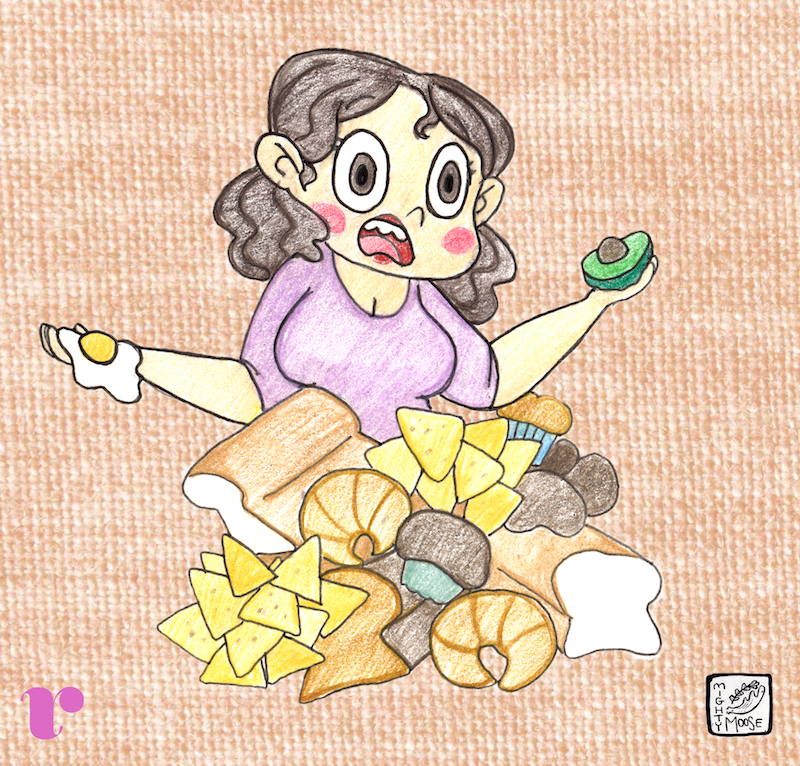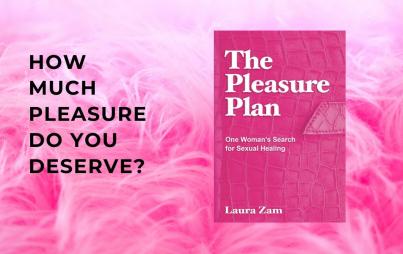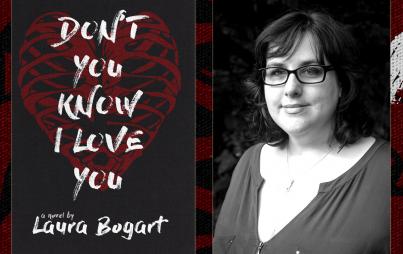
image credit: Mariah Aro Sharp @mightymooseart
A bipolar, body-positive bread enthusiast with a fucked-up pretty much healed ankle and a history of disordered eating chronicles health, weight-loss, and gardening. No diets allowed.
CN: dieting, weight loss
This article discusses dietary changes that may not be right for everyone. Please use caution and consult with your practitioner if you have questions.
You might have heard people talking about the Ketogenic Diet.
You might have heard them say that it’s just another “diet.” You might have heard that it’s Atkins in sheep’s clothing. You might have heard that you’ll never want bacon again after eating keto.
You might have heard a lot of things. But let’s talk science.
Much like being vegetarian, gluten-free, or vegan, the Ketogenic Diet is a way of eating. “Keto” (as you’ll hear it called) is a high-fat, moderate protein, low-carb diet.
The term “ketogenic” points to the physiological state of ketosis. In ketosis, the body adapts to the use of fat for energy, rather than the usual go-to energy source — carbohydrates.
And what are carbs?
To answer that, we have to first define macronutrients. (I know this is getting a little complicated, stay with me.) Macronutrients (or “macros”) are the major components of nutrition.
In humans these are: proteins, fats, and carbohydrates. These three things combined are all the things you need to live.
Proteins are a macro that are from something like meat. These are the building blocks of muscles.
Fats come from, well, fat. Things like coconut oil, butter, the stripey stuff in your steak. Delicious.
You might also like: What I've Learned From 9 Months Of Self-Care (#8 Is What's Up)
Carbohydrates are the most simple form of energy. These are foods our bodies break down quickly and use up just as fast. Carbs are sometimes labeled as “bad” or “good.” “Good” carbs = fruits and veggies. “Bad” carbs = white flour, sugar, bread, basically all things are that super delicious. (More on this in a minute.)
"Bad" carbs are often highly processed (or far from a natural form), think Twinkie. Processed = not recognizable as a food from the earth.
Food does not have morality (ie "good" or "bad"), but we can note that food can be more/less nutrient dense, or provide more/fewer calories. In this regard, we can label foods as providing for us in different ways. Higher fat/protein = longer term energy. Higher sugar, higher carb, less nutrient dense foods = quick energy and quick burnout — we'll call them refined.
These refined carbs are a fickle beast. Kind of like a dude on Tinder looking for a hook-up, they come on strong, and then leave as quickly as they came. If you’ve ever had a few Costco muffins, you know that they might leave you feeling pretty crappy.
Refined carbs are probably to blame for a lot of of the health problems that we are currently facing.
The idea that fat is “bad,” was born in the late 70s, when low-fat, high-carb became the key to "healthy" living.
Only not really.
We’re smarter now and we know that eating all those carbs and low or no fat probably, actually made us sick. Our pancreas isn't meant to work that hard. Our bodies need fat.
WHOOPS.
Ok, with the science lesson out of the way, let's move on.
To review: Keto is a high-fat, moderate protein, low-carb diet.
Reasons you might consider eating a ketogenic diet:
-
Avoiding donut burnout by feeding your body longer lasting energy sources (fats instead of carbs)
-
Clearer thinking (brains like to run on fat)
-
Alleviation of depression
-
Prevention or stalling of Alzheimers and other types of dementia
-
Weight loss
A note on weight loss: Fat is satiating (fancy talk for “fills you up”), which means you are less likely to engage in mindless eating of refined food. Your body runs very efficiently on proteins and fats. For this reason, you might lose weight while eating keto (especially if you have a lot of body fat), simply because you need less food to run your body.
There are other reasons you might lose weight eating keto, but I'm going to skip those because that’s not the compelling reason to give Keto a go.
Ok so how does keto work?
When you eat carbohydrates, your pancreas produces insulin to offset the sugar in your system. Every time you eat a carbohydrate dense food, your pancreas goes to work.
Without a constant influx of quick-energy carbs, your body will shift to using the fats you eat as your primary energy souce. And fat is a very efficient way to run your body.
If your pancreas has spent most of its life on a rollercoaster of insulin production to manage the donuts, it might be getting tired. Or, more accurately, your body may have gotten so used all that insulin, that it needs more and more insulin to produce the same effect that a tiny amount of insulin would have had before the Costco muffins. This is called insulin resistance. This is what leads to Type 2 diabetes.
Dr. Jason Fung, nephrologist (kidney doctor) and author of The Obesity Code*, discusses Type 2 diabetes better than I can:
*While Dr. Fung's book could have been better titled, the science within it is worth careful consideration.
Tl;dw (too long; didn’t watch)?
By changing the way our bodies process energy, we can often change the way our bodies function. This all has incredible implications in is the case of insulin resistance and the development and management of Type 2 diabetes.
Wait, what?
We have historically treated Type 2 diabetes (the kind that is caused by the insulin resistance we discussed above), with MORE insulin.
We have too much insulin so we need more? That doesn’t even make sense.
So what if you eat Keto and chill your pancreas out?
Besides feeling better by eliminating the muffin/insulin/hanger cycle (as illustrated below), you might be able to reverse Type 2 diabetes.
A friend I have is a really great example.
Julie went to the doctor in April (for some pre-op lab work), her fasting blood sugar was 308 (normal is 70-100). Her A1C, the number that measures your average blood sugar (using your body’s cell memory) over a period of three months, was 10.9 (normal is below 5.7, levels above 8 are indicative of untreated diabetes). She was diagnosed with Type 2 diabetes and fatty liver disease.
Scared about her health, Julie started eating a ketogenic diet.
June 23rd, Julie had her labs drawn again. Her fasting blood sugar was 114. Her A1C was 6.1. And that’s in just two months.
Ketogenic eating turned Julie’s life around. She effectively reversed her diabetes. She discontinued the use of all medications. Her fatty live is gone. I talked to Julie today; her fasting blood sugar was 89.
But that’s not all keto has done for her.
Julie went from taking 800-1000 mg of ibuprofen a day 6 or 7 days a week, to zero. Her joint pain is gone.
The anxiety and depression she had been struggling with? Gone.
No longer tired midday, Julie has been able to do everything she wanted to this summer with her three young children.
She didn't set out to lose weight, but she did and greater mobility has enhanced her life as well.
Data like Julie’s can be found easily online, but these numbers came from a person I know. I have known her for many years. We had babies at the same time. We’ve talked about diets and weight-loss. We’ve talked about health, and the fear of losing health.
Julie isn’t data to me. Julie is a real person who really changed her life by changing the way she eats.
One person does not a medical study make. But one honest friend who tells you she has never felt so amazing, is enough to make you consider how eating less of the fast energy carbs that ultimately betray you, might make your brain work better and your head hurt less, might make you feel less like you’re going to pass out at 3 pm, might alleviate your depression, might make you feel better overall.
And so I decided to give a Ketogenic Diet a go.
More on that next week.
PS I love you, bread. Bread, why do you betray me?
(This is an amazing article in Psychology Today that talks all about neurotransmitters and ketone bodies, and how everything from epilepsy to depression to bipolar disorder has been linked to neurotoxicity that eating keto can correct.)







